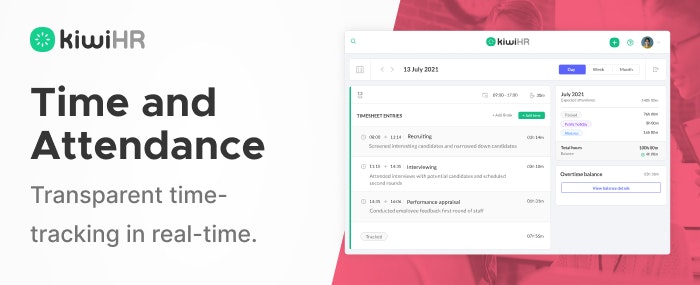- Employee Management
The 3 benefits of time tracking for startups

Startups are a key player of the business landscape, with high growth potential, ambitious goals, and a flexible working model.
In this aspect, time tracking for startups is a major stake for their development strategy in a dynamic and constantly changing world. We will discuss how a time and attendance system can help startups as a cost-effective solution to manage time spent by employees on projects and activities and increase productivity.
1. Time tracking helps meet legal obligations
European Labour Code requires companies to track their employees' working hours. Declarations must be filled at regular intervals and must be stored in case of control by legal authorities. Failing to comply to the rules may result in financial penalties, which may have serious consequences.
In this regard, hiring a human resources specialist is recommended. He or she will have the technical, legal and social skills required to keeping track time spent in the company's projects.
This new role can represent a heavy financial cost, but can save time for other specific projects in the organisation.
In the UK, startups have various legal obligations related to time tracking and employment, and accurate time tracking can help meet these obligations. Here are some of the key areas where time tracking can help startups meet their legal obligations:
-
Employee Working Hours: The UK has specific regulations regarding the maximum working hours that employees can work, which is 48 hours per week on average. Time tracking can help startups monitor employee working hours and ensure that they are compliant with these regulations. Accurate time tracking data can also be used to calculate employee overtime and ensure that employees are paid appropriately for any additional hours worked.
-
Minimum Wage Compliance: The UK has laws that establish a minimum wage for employees, and startups must ensure that their employees are paid at least the minimum wage for all hours worked. Time tracking can help startups accurately track employee hours worked and calculate employee pay, including overtime, to ensure that they are in compliance with minimum wage laws.
-
Record Keeping Requirements: The UK requires employers to keep accurate records of employee working hours, which includes the number of hours worked and the rates of pay. Time tracking can help startups meet these record-keeping requirements by providing accurate data on employee working hours and pay rates. This information can be used to support payroll and tax calculations, and can also be used to demonstrate compliance with labour laws if audited by regulatory bodies.
-
Health and Safety Regulations: The UK has strict health and safety regulations that employers must adhere to, including regulations related to working hours and rest breaks. Automated time tracking can help startups monitor employee working hours and rest breaks, and ensure that they are providing employees with the appropriate amount of rest and breaks as required by law. Accurate time tracking data can also be used to demonstrate compliance with health and safety regulations if audited by regulatory bodies.
2. Time tracking assists Managers in their HR management
In order to set up the best time tracking tool, both the technical and human aspects of the organisation are essential. Many startup managers implemented employee time tracking in order to have a successful project management. However, the company and employee must increase their productivity in a context that promotes a culture where each stakeholder is kept motivated. Time tracking enables, both on-site and remote employees to stay productive, while helping managers to support them in their development.
Working time tracking for more productivity
To optimise productivity, project managers must measure the time spent on activities and projects by the team members. This must be included in the strategy implementation by creating dashboards to identify the key areas of improvement. Therefore, time tracking allows companies to identity:
-
Time-consuming activities and allocate the appropriate number of employees to them
-
The most qualifies employees to a particular task
-
The best team composition for each project
It is essential to establish and maintain a level of productivity that is competitive in the market. To reach this goal, it is beneficial for startups to involve their employees in the process and ensure they adhere to it without feeling restricted.
Gain time with an easy-to-use time tracking software

Employees should be encouraged to effectively manage their working hours
It is essential for the successful implementation of working time management to cultivate a positive environment within the organisation. Managers should:
-
Communicate their policy clearly to employees
-
Outlining the rationale behind their decisions to implement a working time management system
-
Describing how the system works
-
Emphasising the potential benefits it will bring to the organisation as a whole
Managers should take advantage of this dynamic to effectively develop human capital through training and recognition of skills.
Clear, transparent and regular communication is essential to ensure employees adhere to policies regarding monitoring and managing working hours in startups.
Teams help maintain productivity and flexibility, while adhesion facilitates the implementation of a time tracking tool. Optimising productivity through employee adhesion provides a second key competitive advantage for market positioning.
3. Time tracking helps startups achieve a solid development strategy
Startups are rapidly growing structures. However, funding their activities remains often tricky. Looking for investors to ensure their growth, leaders are faced with the question of balancing their budgets. In this context, precise budget monitoring and optimization of human resources in project management are essential.
Budgetary Tracking of Projects
Close budget monitoring of activities allows leaders to take informed decisions on the allocation of resources in order to set goals.
Time tracking and management allow leaders to analyse precisely the cost of each project. It also allows them to measure the financial impact of every decision made in resource allocation.
In the context of fundraising, budget tracking:
-
Is an essential tool in the forecasting management of a startup’s projects and growth
-
Allows identifying any potential issues in the budget balance by quickly addressing them
-
Allows presenting well-constructed and reliable financing plans to investors
Time tracking startup: optimization of Human Resources and Skills
Calculating project costs also relies on the cost of labour hours for teams and different employees in the organisation. This is an essential component in calculating direct costs, particularly in small businesses.
Time management in startups allows identifying the staff necessary for activities and to quickly adjust working hours. Furthermore, this allows for identification:
-
The need for collaborators to cope with an increase in activity
-
Specific skills that are missing to improve the completion of a project
-
Reorganizing teams to maintain a high technical level.
The integration of new employees, upskilling of certain team members, and the redistribution of tasks can all contribute to the cost management of projects.
As such, budget tracking and optimizing human resources are essential elements that should be taken into consideration when developing organizational policy in order to gain a competitive advantage.
In summary
In order to ensure their presence, responsiveness and sustainability in their market, startups must:
-
Face their regulatory social obligations
-
Manage their human resources
-
Secure their development and growth strategy
In order to fulfil all these requirements, a good time automatic time tracking should be implemented in order to facilitate project tracking and management. This time tracking tool can be beneficial in terms of investment choices, and its return on investment should be taken into consideration when making decisions regarding corporate governance.
Welcome to our mailing list! We hope you enjoy our content!


